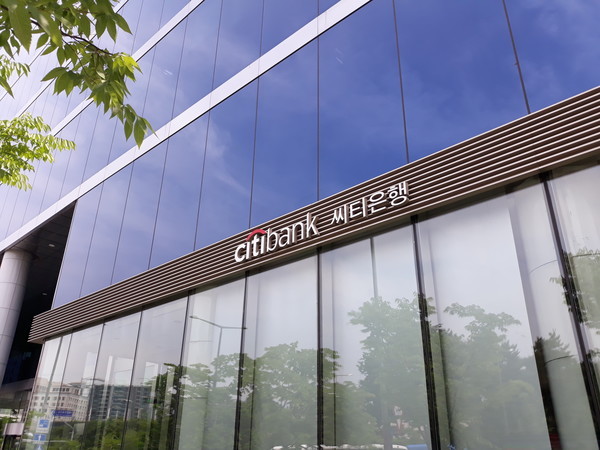
Citibank Korea’s main office in Seoul (Yonhap)
South Korea’s top financial regulator vowed Friday to minimize inconveniences caused by Citigroup’s decision to withdraw retail banking operations in 13 markets, including South Korea, as part of its business reorganization for Asia.
“The Financial Services Commission and the Financial Supervisory Service will closely monitor future progress regarding the group’s latest decision and review necessary measures to minimize any possible consumer inconveniences, stabilize employment and protect customer data,” the FSC said in a statement.
The US banking giant announced on Thursday afternoon that it would pull its consumer banking units in Australia, Bahrain, China, India, Indonesia, Korea, Malaysia, the Philippines, Poland, Russia, Taiwan and Thailand, to trim its consumer banking operations with a focus on business finance.
Concerns are growing among customers, who have used the lender’s loans and deposits, over possible inconveniences with banking services as the lender is expected to close down its local branches as part of its withdrawal plan, industry sources said.
The volume of loans taken out by Citibank Korea’s customers amounted to 24.7 trillion won ($22.1 billion) and that of deposits reached 27.3 trillion won, as of the end of last year, data showed.
The number of Citibank branches in Korea sharply fell to 39 in March of last year from 133 in 2016.
“Until we confirm specific action plans for the withdrawal, the current banking services, including loans and deposits, will be offered to customers as usual without disruptions. We will come up with measures to prevent inconveniences the announced divestiture plan may cause,” a Citibank official said.
Citibank Korea now weighs whether to overhaul its retail business or sell off to a local financial institution. If the sale takes place, OK Financial Group and DGB Financial Group are likely to enter a bidding battle for the foreign-based lender.
The former, which runs OK Savings Bank, has been seeking to advance into the top-tier banking sector, while the latter -- the nation’s first regional bank headquartered in Daegu -- would have the intention of expanding its reach to the Seoul metropolitan region, industry sources said.
Meanwhile, Citibank Korea’s labor union held a street rally earlier in the day to express their opposition to the bank‘s decision, with concerns over job security caused by the envisioned restructuring plan.
The number of Citibank Korea employees stood at 3,500 as of the end of last year. Of the total, nearly 940 work in the bank’s retail banking sector.
According to Citibank Korea, the exact timetable and action plans for the disposal of the retail arm have not been finalized.
The lender will review follow-up measures for the planned business restructuring in close consultation with the board of directors as well as financial authorities.
Citigroup opened its first branch in Korea in 1967 and launched Citibank Korea Inc. in 2004 after acquiring KorAm Bank.
Rumors of the Korean subsidiary’s withdrawal have surfaced every three years since 2014, when the bank conducted large-scale voluntary retirements. The bank’s closure of 101 brick and mortar branches in 2017 further flamed rumors, along with a steady decline in the company’s earnings. Its net profit in the first three quarters of last year plunged 38 percent on-year to 161 billion won, data showed.
“The prolonged low interest rate environment coupled with the impact of COVID-19 appears to have led the global banking group’s decision to divest its retail-banking business in Asia’s fourth largest economy,” said a senior research fellow at the Korea Institute of Finance.
By Choi Jae-hee (
cjh@heraldcorp.com)





![[KH Explains] How should Korea adjust its trade defenses against Chinese EVs?](http://res.heraldm.com/phpwas/restmb_idxmake.php?idx=645&simg=/content/image/2024/04/15/20240415050562_0.jpg&u=20240415144419)
